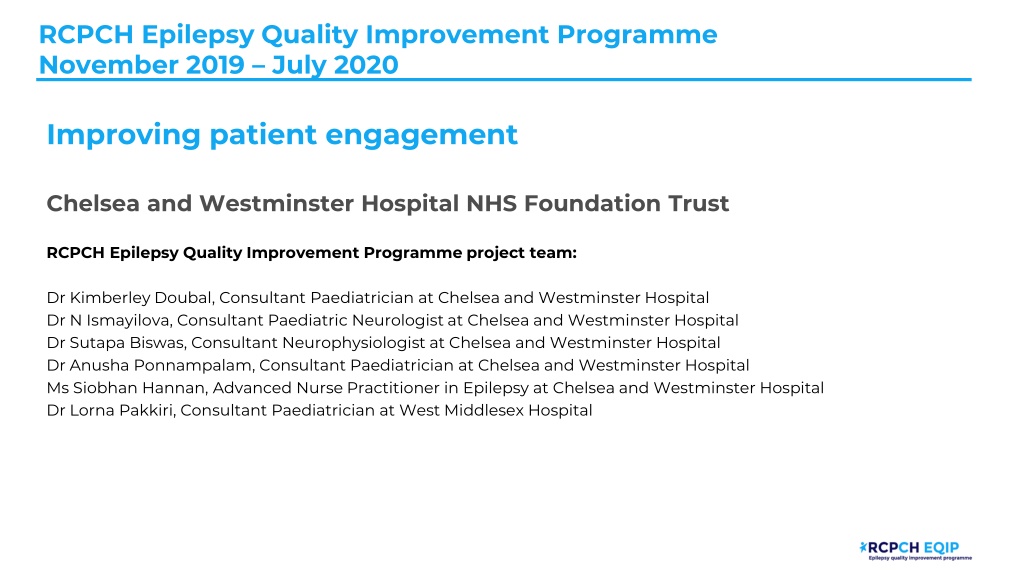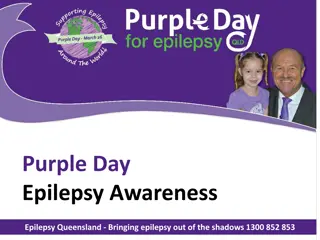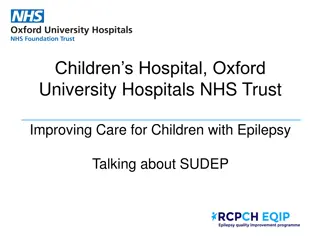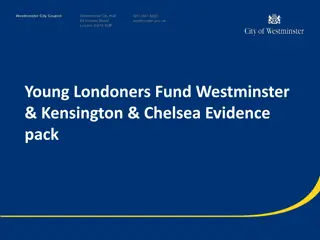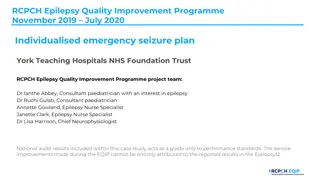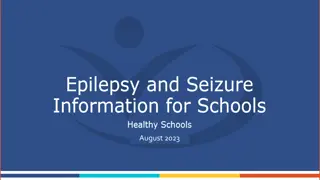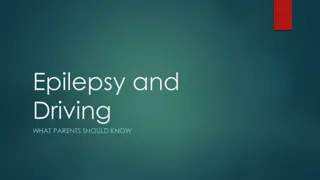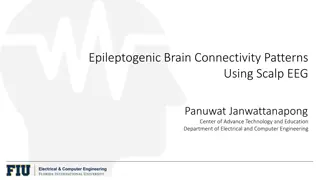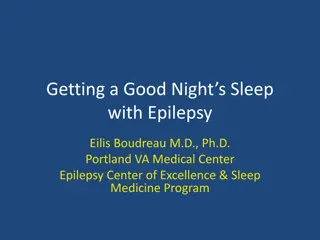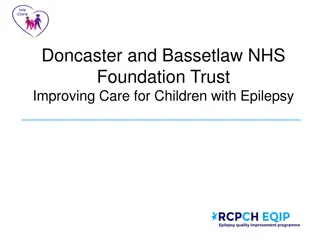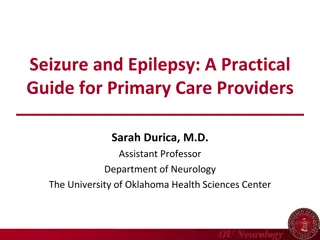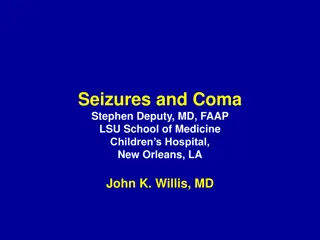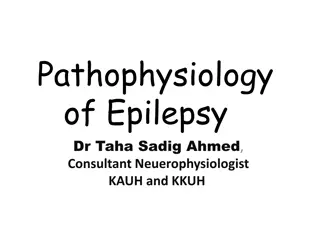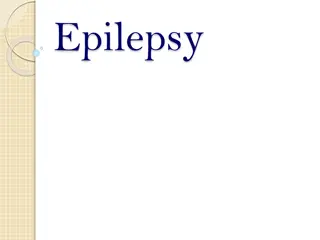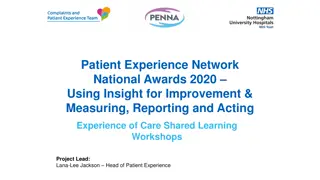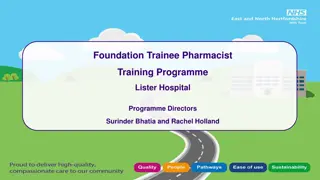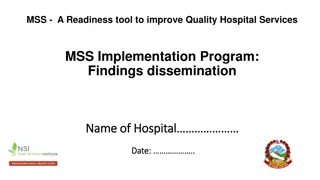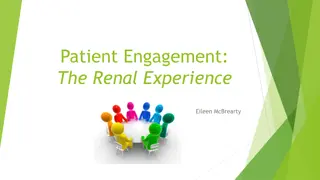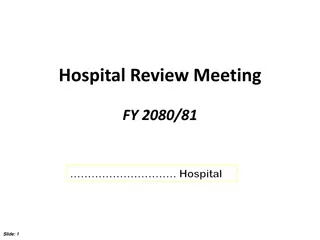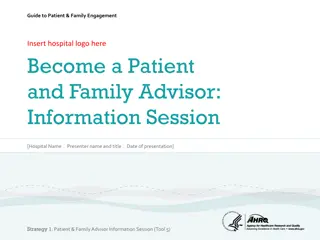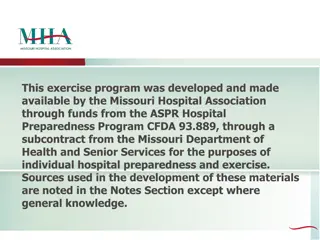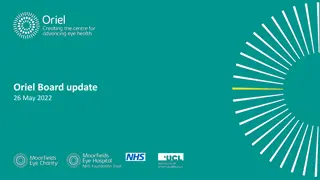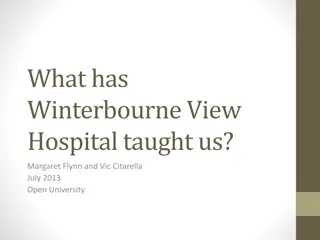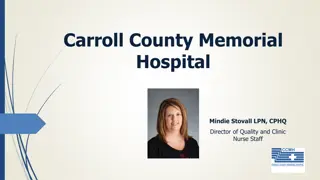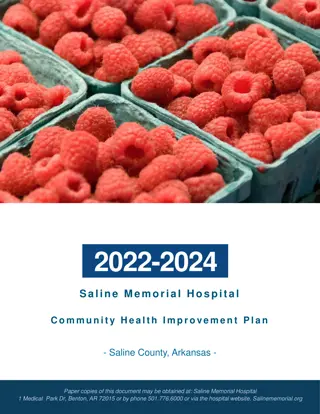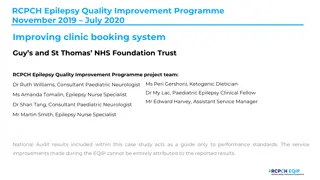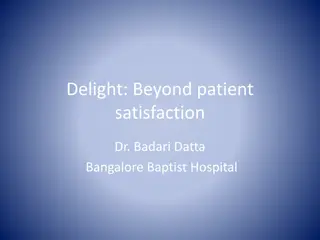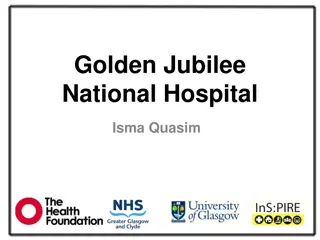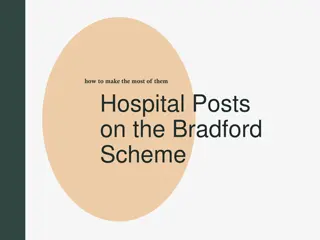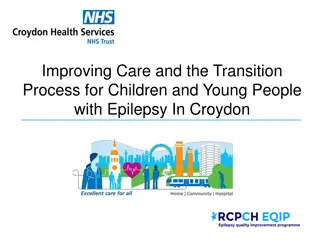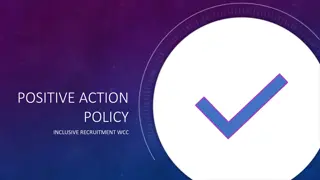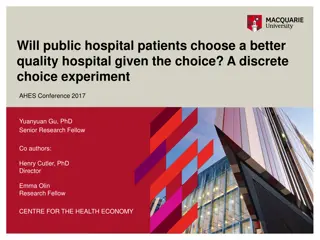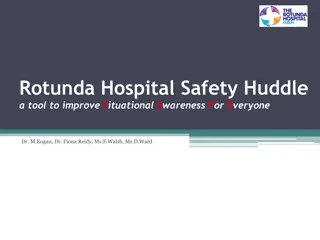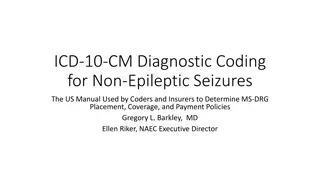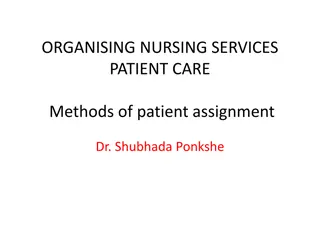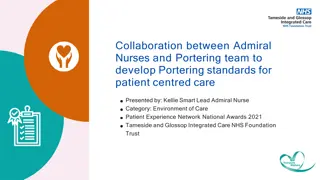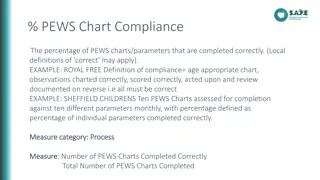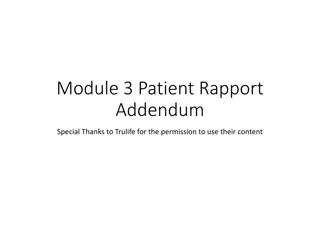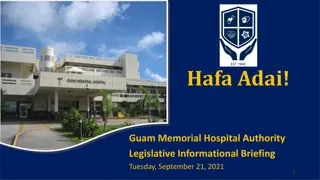Epilepsy Quality Improvement Programme: Enhancing Patient Engagement at Chelsea and Westminster Hospital
The RCPCH Epilepsy Quality Improvement Programme at Chelsea and Westminster Hospital aimed to involve patient feedback for improving epilepsy services. Despite challenges due to the pandemic, the project team explored various feedback methods and designed a questionnaire to gather patient perspectives on care experiences and priorities. The initiative was temporarily paused but highlights the importance of patient engagement in enhancing epilepsy care services.
Download Presentation

Please find below an Image/Link to download the presentation.
The content on the website is provided AS IS for your information and personal use only. It may not be sold, licensed, or shared on other websites without obtaining consent from the author. Download presentation by click this link. If you encounter any issues during the download, it is possible that the publisher has removed the file from their server.
E N D
Presentation Transcript
RCPCH Epilepsy Quality Improvement Programme November 2019 July 2020 Improving patient engagement Chelsea and Westminster Hospital NHS Foundation Trust RCPCH Epilepsy Quality Improvement Programme project team: Dr Kimberley Doubal, Consultant Paediatrician at Chelsea and Westminster Hospital Dr N Ismayilova, Consultant Paediatric Neurologist at Chelsea and Westminster Hospital Dr Sutapa Biswas, Consultant Neurophysiologist at Chelsea and Westminster Hospital Dr Anusha Ponnampalam, Consultant Paediatrician at Chelsea and Westminster Hospital Ms Siobhan Hannan, Advanced Nurse Practitioner in Epilepsy at Chelsea and Westminster Hospital Dr Lorna Pakkiri, Consultant Paediatrician at West Middlesex Hospital
Improving patient engagement- Chelsea and Westminster Hospital NHS Foundation Trust Project aim To access the patient voice in 80% of patients accessing epilepsy services at Chelsea & Westminster and West Middlesex Hospitals, between January and March 2020, to influence improvements in cross-site epilepsy care. Background: An NHS Trust is split across two sites, encompassing secondary and tertiary level paediatric epilepsy services and diagnostics, including MRI and EEG. Both services at Chelsea and Westminster Hospital and West Middlesex Hospital are stretched well beyond capacity due to staff vacancies and long waiting times, resulting in NICE quality standards not being met in many areas across both sites. At present, there are several patient pathways used by families to access care and diagnostics, which makes standardising services and improving the patient journey more challenging. As a wider team working in geographically distant areas, there are limited opportunities to meet but share a desire to improve services across the board. To date, patient engagement has not been actively sought, and believe this will be the cornerstone to driving improvements. Area of focus The team are open to engaging with their patients and families to help explore and plan for the area of focus that would impact them most in terms of improvement.
Improving patient engagement- Chelsea and Westminster Hospital NHS Foundation Trust Changes Team members explored different methods of collecting feedback via pasta voting with single questions displayed and explored the idea of an app-based questionnaire with a small number of patients. Feedback from families expressed a preference for a short questionnaire, which involved the team working with Emma Sparrow, RCPCH&US Head of CYP Engagement, to design and refine questions for the questionnaire. Each team member contributed to the design of the questionnaire. The questions were mostly based around the NICE quality standards for epilepsy and aimed to gain insight into the patients experience of the care they had received so far, as well as their priorities for future care. The plan was to disseminate the questionnaire to all follow-up patients attending secondary-level epilepsy clinics, ANP clinics, tertiary neurology clinics, and EEG appointments. However, in mid-March, the effects of the pandemic led to both Trust sites and secondary care level paediatricians self-isolating, resulting in clinics being cancelled and rearranged. All clinic appointments were converted to telephone appointments, which made the dissemination of the questionnaire method impractical and was therefore temporarily put on hold. There was a change in service focus to maintain a safe epilepsy service amid severe staff shortages.
Improving patient engagement- Chelsea and Westminster Hospital NHS Foundation Trust Result By the end of March 2020, 58 completed questionnaires had been returned. 24 via the Chelsea and Westminster Hospital advanced epilepsy nurse practitioner. 24 via Chelsea and Westminster Hospital secondary and tertiary level epilepsy consultants. 10 were completed via Chelsea and Westminster Hospital. Summary of Questionnaire results: Thinking about the epilepsy care you have had, what did you find most useful: Overwhelmingly most common response was access to a specialist (epilepsy nurse practitioner / o neurologist / play specialist / psychologist) with 43 responses. 21 referred specifically to the epilepsy nurse practitioner. The second most frequent response was: access to advice on queries about epilepsy between appointments with 26 responses. o Thinking about getting the help you need, what is most important?: Most common response was being able to speak to a member of the epilepsy team when needed with 43 o responses.
Improving patient engagement- Chelsea and Westminster Hospital NHS Foundation Trust Questionnaire results Diagnostic referrals MRI 8 16 10 5 1 EEG 3 28 16 3 1 VT 15 2 3 0 5 Not referred 0-1m 2-3 months 3-6 months More than 6 months How confident do you feel in your knowledge of epilepsy and how to manage it? Very confident Quite confident Neither confident or uncertain Quite uncertain Very uncertain 19 27 11 2 0 Where do you Prefer to get information about epilepsy? Face to face with a doctor or epilepsy specialist nurse In a leaflet online other 45 4 11 2 (both replied they preferred on the phone)
Improving patient engagement- Chelsea and Westminster Hospital NHS Foundation Trust Challenges Time constraints and annual leave over the Christmas period (2019) led to difficulties meeting as a team to finalise the questionnaire, causing a delay in the process until mid-January. There were several challenges with distributing the questionnaires to patients via reception staff. This meant making a change to the process by distributing the forms during clinic appointments, with the assumption there would be time to complete the questionnaire at the end of the consultation. Despite this, there was a significant non-return rate, presumably because patients felt unable to refuse to fill out the questionnaire when asked. There were up to 18 clinics operating simultaneously at both sites, and the appointment check-in process would often cause a bottleneck, resulting in clinics running late. Due to the pandemic, it became impossible for the team to arrange in-person team meetings because of cross- site working; instead, the team arranged conference calls to discuss the project and survey design and questions. The team struggled to keep all team members updated on their project progress and the avoidance of duplication of work. Due to the differing roles within the teams and pressures experienced in the various areas of the service, the team was unable to agree on the priorities of where to focus questions that were relevant to both the secondary and tertiary services and neurophysiology.
Improving patient engagement- Chelsea and Westminster Hospital NHS Foundation Trust Challenges The service suffered an increase in the number of appointment DNAs as the pandemic evolved. The team began to have difficulties keeping track of the return rate to identify the proportion of respondents. During the EQIP, the tertiary epilepsy nurse practitioner left the Trust, which impacted the team, which meant the service had to begin the process of recruiting for a replacement. The team was able to achieve their initial aim of collating feedback from their patients and families on required service improvements but was unable to begin testing and developing an area of improvement based on the results received due to a number of challenges affecting the team during the course of the programme.
Improving patient engagement- Chelsea and Westminster Hospital NHS Foundation Trust Outcomes In terms of feedback received by the returned surveys from patients and families seen by the advanced epilepsy practitioner, various words and phrases clearly demonstrated a theme such as "accessible, "reliable," and return calls." The questionnaire responses reported a higher level of confidence in the knowledge of epilepsy, and the qualitative data highlighted high levels of satisfaction with accessibility and the speed of queries being answered by the epilepsy nurse. At Westminster Hospital, during the pandemic, a band 6 nurse was offered a secondment to help with supporting the team, and it is hoped funding will be made available to recruit a fully trained epilepsy nurse. Results from the questionnaire reaffirmed the need to create a business case for the role. Other survey results showed that patients desired to have more time to ask questions, and to not feel rushed during clinic appointments. In response to the results, the team plans to include some feedback from the survey questions within the business case. This will help to demonstrate the need for an epilepsy nurse to join the team to help educate patients on their health care. Potentially leading to shorter consultant appointments, increasing clinic time, and reducing waiting times. The team also plans to use the survey results to make the service changes required in conjunction with the NICE standards and audit results from Epilepsy12.
Improving patient engagement- Chelsea and Westminster Hospital NHS Foundation Trust Lessons learnt It was clear from the questionnaire that the role of an epilepsy specialist nurse is vital for patients. The aim at the start of the project was always to try to improve collaboration between the cross-site teams within the Trust. Virtual meetings are an important step towards cohesive cross-site working. The EQIP was able to achieve two geographically distant teams working together and having the space to review both services, aiming to act as one, reducing inequalities between services, and learning from each other. There have been huge changes within the department, but it is felt that this type of change should be the springboard to redesign the service, aiming for improvements affecting both staff and patients. The feedback received from the questionnaire clearly highlights the priorities for improvement in the service for patients. The collaboration and discussion generated from the project have also forced the team to consider their priorities for improvement across both sites, allowing for a greater understanding of the challenges faced by both hospitals. Virtual meetings seem to be the foundation of the new normal' of service, both between staff and patients. The introduction of a video-conferencing platform for use by the Trust should improve things further. As the situation evolves and the service continues to adapt in line with the pandemic, it will be important to remain flexible and willing to try new ways of working in terms of small tests of change. Visual presentation of team project intervention Video presentation Team project posters
https://eqip.rcpch.ac.uk eqip@rcpch.ac.uk @RCPCHEQIP
